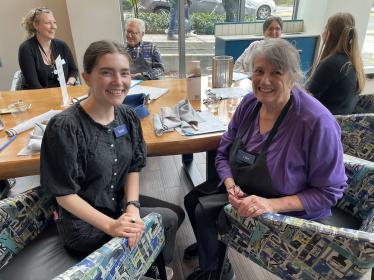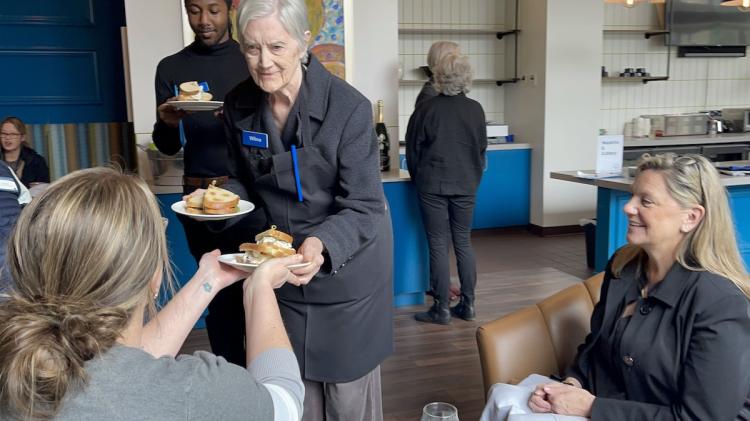This month, we were excited to co-host the second run of Bridges Bistro - a unique dining experience in which the servers are individuals living with memory loss or dementia. This pop-up event, based on the Restaurant of Mistaken Orders in Japan, is to our knowledge the first of its kind in the U.S.
For this event, hosted at the Bistro at Murano Senior Living, we invited a group of neighbors and supporters to participate and offer feedback.
"This kind of event opens eyes to what the world can look like for people living with dementia when they are given opportunities," says Sarah Pfeiffer, a UW Memory and Brain Wellness Center social work practicum student at the Memory Hub, who has helped to make this event a success.
Organized by Murano Senior Living and the Memory Hub, Bridges Bistro aims to build dementia awareness while providing a meaningful volunteer opportunity for people with dementia. We hope to be a bridge of connection between our neighbors with memory loss and dementia and the wider community.

Sarah Pfeiffer (MBWC, Memory Hub) and server Lisa
In Bridges Bistro, servers take the lead in the many steps involved in table service at a restaurant. They greet guests, ask for drink and food orders, and record the orders on paper. They answer questions about the food. They deliver the order. They check in to offer more water. They bring the bill. Working in a community of support, each server is accompanied by an aide who walks alongside them and helps as needed.
For the guests, each table has a little list of helpful communication tips, such as speaking slowly, simplifying questions, and avoiding open-ended questions.
“I didn’t know what to expect at first,” said a server named Lisa. “Would people make fun of the confused people? But my favorite part was talking with people. People were positive and welcoming.”
Lisa said that she enjoyed wearing the black apron and nametag, among other servers. “The nice thing about wearing a uniform is that it tells someone who you are, right away. I look official.” She felt that people could instantly recognize her and respect her role.
Another server feels that Bridges Bistro provides a way for the participants to communicate what they would like the public to know about living with memory loss or dementia.
“The ability to remember events may be short-lived,” said server Kimberely Rettig. “However it is living the event that shapes who we are forever.” •
Genevieve Wanucha





